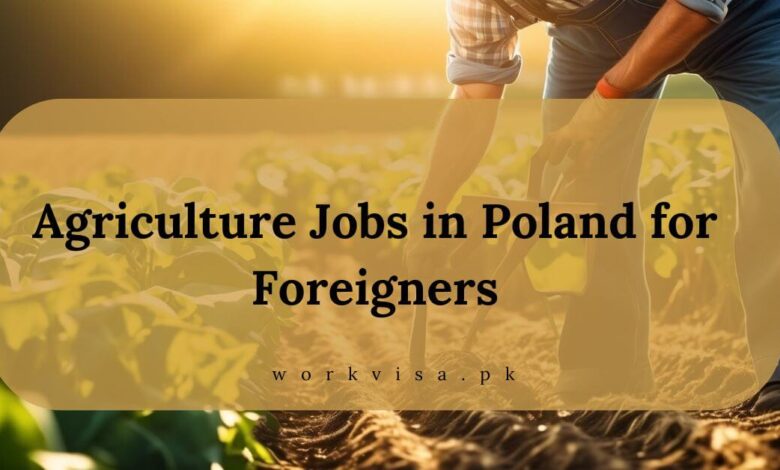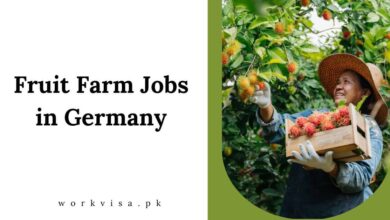Agriculture Jobs in Poland for Foreigners 2025 – Sponsorship

Poland’s agricultural sector is a key pillar of the economy, employing thousands of local and foreign workers. With an increasing demand for fresh produce, livestock, and sustainable farming, Poland offers a wide range of job opportunities for those willing to work in rural areas. Many employers provide visa sponsorship, making it easier for international job seekers to secure legal employment. If you’re looking for a stable job with competitive wages, accommodation benefits, and opportunities for skill development, agriculture jobs in Poland might be the right choice for you.
Check Also: Visa Sponsorship Fish Packing Jobs in Poland
Why Consider Agricultural Jobs in Poland?
Agriculture remains one of Poland’s most essential industries, contributing significantly to both the local economy and international exports. The country is a major producer of wheat, potatoes, mushrooms, apples, poultry, and dairy products.
Top Reasons to Work in Poland’s Agriculture Industry:
Growing Demand for Workers: With labor shortages in the agricultural sector, foreign workers are highly valued, especially during peak harvesting seasons.
Visa Sponsorship & Work Permits: Many Polish agricultural employers sponsor foreign workers, assisting with work permits and legal documentation.
Competitive Wages & Overtime: Salaries range from 3,500 to 5,000 PLN ($850–$1,200 per month), with opportunities for overtime pay.
Seasonal & Long-Term Jobs: Workers can choose between short-term seasonal contracts or long-term employment opportunities.
Housing & Meals Provided: Some employers offer free or subsidized accommodation and meals, reducing the cost of living.
Pathway to Permanent Residency: After years of continuous employment, some workers qualify for extended visas or residency permits in Poland.
Skill Development: Workers gain valuable hands-on experience in farm management, machinery operation, animal care, and sustainable agriculture techniques.
Cultural Exchange: Working in Poland allows foreign laborers to experience the country’s rich traditions, cuisine, and rural lifestyle.
Types of Agriculture Jobs in Poland:
Foreigners have access to a wide variety of agricultural jobs, including:
1. Crop Farming
- Planting, watering, and harvesting crops (wheat, potatoes, corn, sugar beets, etc.).
- Operating and maintaining agricultural machinery such as tractors and irrigation systems.
2. Fruit & Vegetable Farming
- Picking and packaging fruits and vegetables (apples, cherries, berries, tomatoes, cucumbers).
- Sorting and preparing produce for export.
3. Mushroom Cultivation
- Poland is Europe’s largest producer of mushrooms, making this an in-demand job sector.
- Responsibilities include sorting, cleaning, and packaging mushrooms for sale.
4. Livestock & Poultry Farming
- Feeding, breeding, and taking care of cattle, pigs, and chickens.
- Dairy farming (milking cows, maintaining hygiene, and processing dairy products).
- Poultry farm workers assist with egg collection, chick rearing, and facility maintenance.
5. Beekeeping (Apiculture)
- Maintaining beehives and extracting honey.
- Harvesting beeswax, royal jelly, and other bee-related products.
6. Aquaculture (Fish Farming)
- Raising fish in controlled environments for food production.
- Monitoring water quality and fish health.
7. Agroforestry & Sustainable Farming
- Cultivating crops and raising animals while maintaining forest sustainability.
- Using organic farming techniques to improve soil health.
8. Greenhouse Farming
- Growing flowers, fruits, and vegetables in controlled environments.
- Managing plant health, watering schedules, and climate control systems.
Job Requirements for Foreigners:
While most agricultural jobs do not require formal education, some basic qualifications and skills can improve job prospects:
Age Requirement: 18+ years old.
Experience: Some employers prefer 1–2 years of farm work experience, but many accept beginners.
Language Skills: Basic English or Polish is helpful but not always required.
Physical Fitness: Farming jobs are physically demanding, requiring stamina and strength.
Legal Documentation: Valid passport and ability to apply for a work permit.
Salary & Benefits for Agricultural Workers in Poland:
Salary Range: 3,500 to 5,000 PLN ($850–$1,200) per month
Overtime Pay: Extra wages for working beyond regular hours
Accommodation: Free or subsidized housing offered by some employers
Meals: Some farms provide free food or meal allowances
Paid Leave: Available for long-term employees
Work Visa Assistance: Many employers help workers obtain necessary legal permits
Cost of Living in Rural Poland:
- Rent: 500–1,500 PLN per month (if not covered by employer)
- Food: 300–600 PLN per month
- Transportation: 100–300 PLN per month
- Total estimated expenses: 1,000–2,500 PLN per month, allowing workers to save a good portion of their salary.
How to Apply for Agriculture Jobs in Poland (Step-by-Step Guide)?
Step 1: Find a Job
Search for job listings through:
- EURES (European Job Mobility Portal): https://ec.europa.eu/eures
- Recruitment Agencies Specializing in Farm Work
- Company Websites of Large Agricultural Employers
Step 2: Submit Your Application
- Prepare a resume (CV) highlighting any farm work or physical labor experience.
- Include a copy of your passport and any reference letters from previous employers.
Step 3: Secure a Work Visa
- Once hired, your employer will help you apply for a Type D Work Visa.
- You will need:
- A valid passport
- Job offer letter from a Polish employer
- Proof of accommodation (if applicable)
- Visa application fee (~80 EUR)
Step 4: Travel to Poland & Begin Work
Frequently Asked Questions:
-
What is the work visa process like?
Employers typically assist with work visa applications, which take 4-8 weeks to process.
-
Do I need experience to work in Poland’s agricultural sector?
Some jobs require experience, but many entry-level positions are available for beginners.
-
What is the average salary for agriculture jobs in Poland?
Salaries for agriculture jobs in Poland range from 3,500 to 5,000 PLN per month, depending on the role, experience, and working hours.



